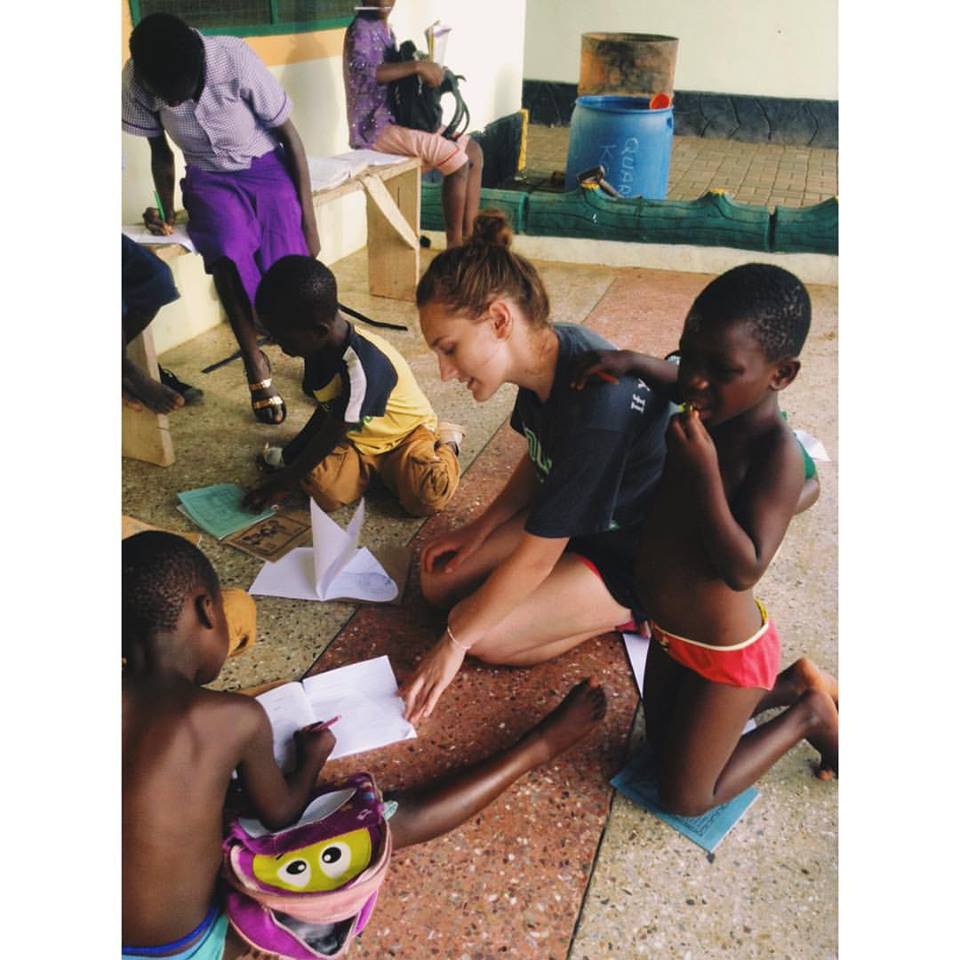Childcare Volunteering In Ghana
An Interview with Amber Moore
January 15, 2016
Every now & again, you come across a person who radiates love & light, leaves a lasting impression on your heart, and embodies everything good in the world. For me, Amber Moore was one of those people. I had the opportunity to interview this remarkable young woman, and as soon as I heard what she had to say, knew I had to use my platform to spread the word.
Amber recently spent 10 weeks in Senya-Beraku, Ghana volunteering with 54 wonderful children, aged 4-16, at “Becky’s Home”, an orphanage founded in hopes of giving quality education to the poor, orphaned, and needy through the creation of a comfortable home. Here is her story…
Asia: Can you tell me about yourself? What compelled you to do this work?
Amber: I’m 18, & live in a small town in Iowa working as a plasma tech at Bio Life Plasma Center. I just recently finished high school last May, but the closer I got to graduation, I knew something didn’t feel right. I wasn’t getting excited looking at schools or for scholarships. I started to explore the possibility of volunteering with different organizations, and came across Becky’s Home, an organization whose goal it is to watch children grow up to become useful citizens of society, and help them do so by equipping them with the tools necessary to become future leaders to impact generations to come. I chose Becky’s Home for many reasons: Affordability and authenticity of the program were important to me, both of which it offered. I wanted to make sure my time & money was going toward a good cause. Another important factor in my decision was choosing a non-religious program. My devotion to faith was a huge reason why I wanted to go in the first place, but at the same time, I didn’t want to limit myself & only be surrounded by people who thought the same as me. I wanted diversity. During my stay, I had roommates from Canada, Spain, the UK, China, and the United States.
Asia: What are some challenges that the orphanage is facing right now?
Amber: Lack of funding & education. Seth, the founder of the organization, has amazing dreams and goals for the orphanage and for the children. He wants to eventually build a school & clinic on-site to ensure that the children receive a proper education and healthcare. They currently go to a local school, which is less-than-great education wise. He’d also like to be able to get clean, filtered water and a consistent food source, but lack of funding makes it very difficult. We are so thankful for every donation that’s made, but just wish we had a reliable source of income. Anxiety gets high not knowing where we’ll find the money for water or medical bills. Seth works so hard daily for these kids, even using his own money at times. One of the biggest things that I focus on is making sure the girls get equal education and gender equality is present throughout the orphanage. Also, helping them learn to be self-sustaining through growing and raising their own food, and therefore being less dependent. Asia: What did you do during your time at the orphanage? What did a typical day look like?
Asia: What did you do during your time at the orphanage? What did a typical day look like?
Amber: As there is no average day for us, it might be a bit difficult to accurately lay it out. But we can sure try!
Mornings– The volunteers wake up at 5 AM to head to the orphanage, which is about a 6-7 minute drive up the road. There, we begin bathing & dressing all of the children for school, which starts at 7. My favorite was to help cook the breakfast over the fire & then serving it to everyone. It was hard, sometimes, because I wanted to give each child more food, but there just wasn’t enough. After breakfast, we help clean everyone up, make sure they all have their school bags, & that their homework is done. The bus arrives, and we cram everyone in & head off to school. Once we arrive, everyone goes to their respective classes, and each volunteer goes some place else. Some mornings, I’d skip breakfast to stay at the school & help out with teaching lessons, making sure our kids had what they needed. Other days, we’d all go back to our house & have breakfast, which consisted of bread most days. We would sit around the table talking about the kids, and what we had planned for them that day. I would often go up to Seth’s house, where we would regularly talk about upcoming projects, where we could seek funding, etc. Money never left any of our minds, not even for a minute. Lack of internet is a major roadblock for communication, so the volunteers are these children’s voice. In the ten weeks I was there, we held fundraisers to pay for the registration for the bus, school expenses, clothing, and my own personal project – 150 chickens & a chicken coop.
Afternoons- Around lunchtime, the kids would go on break to play & eat. I would go to the school during this time to hang out with the kids and help Vida, the cook, to serve and clean up. I normally carried extra change in my bag for the kids to buy a snack if they were still hungry. This time also includes checking with the teachers on how everyone was behaving. When lunch was over, I would walk down and stop by the daycare, where two of our children were, as well as Seth’s son, OB. The two children are Desmond, who’s 5 and has cerebral palsy. He doesn’t walk or speak much. Then there’s Prof who is 4, but very underweight due to being born prematurely. At the daycare, they play games and read books. We donated some books for Madam Sarah to use in class. Sometimes, they even get a treat like chalk or balloons! Between lunch and 3 pm, we mostly have free time to do as we please. We liked to go into town to pick up food. Many volunteers made close friendships with locals. We loved spending time with them. Our two favorites were Reuben, 20, and Vincent, 19. They became my best friends there. At 3, we head back to the school to pick the children up & bring them back to the orphanage for the night. As soon as we’re back, the first thing we have everyone do is sit down & look at their homework for the day. I always carried extra pencils in my bag to ensure they could do their homework; the kids often lose them. No one was allowed to change from their uniform until homework was done and checked. Education is extremely important, and because of this, we strive everyday to make sure that they did their best. Once homework is done, they are all free to play. Evenings- The older kids will start to do the laundry, as it takes a long time to hand wash clothing for 48 people. Others will help with the dishes and preparing food to cook for dinner. The volunteers lend a helping hand with whatever is needed, and often spend time interacting with the young children who aren’t able to do chores yet. Evenings also included physical and speech therapy, which we conducted. It was our hope to do it twice a day, both at lunch and at night, but sometimes could only get around to it once. We would try to get back to the volunteer house before 6 pm because that’s when it gets dark and puts you at high risk for malaria. We liked to joke and say “It’s Malaria time!” between 6 am & 6 pm. During those hours, we tried to avoid going outside unless absolutely necessary. After our duties, nights would consist of hanging out and talking. It was the laid-back part of the day, where we had a chance to call our families, upload pictures, look into fundraising ideas, that sort of thing. Normally, everyone was asleep by 10. Then, we’d wake up & do it all over again!
Evenings- The older kids will start to do the laundry, as it takes a long time to hand wash clothing for 48 people. Others will help with the dishes and preparing food to cook for dinner. The volunteers lend a helping hand with whatever is needed, and often spend time interacting with the young children who aren’t able to do chores yet. Evenings also included physical and speech therapy, which we conducted. It was our hope to do it twice a day, both at lunch and at night, but sometimes could only get around to it once. We would try to get back to the volunteer house before 6 pm because that’s when it gets dark and puts you at high risk for malaria. We liked to joke and say “It’s Malaria time!” between 6 am & 6 pm. During those hours, we tried to avoid going outside unless absolutely necessary. After our duties, nights would consist of hanging out and talking. It was the laid-back part of the day, where we had a chance to call our families, upload pictures, look into fundraising ideas, that sort of thing. Normally, everyone was asleep by 10. Then, we’d wake up & do it all over again!
It’s times like these that I’m so glad to be a part of a responsive, compassionate blogging community. Together, let’s get the story of these beautiful children out to as many readers as possible!
Amber shared with me that Becky’s Foundation has a website for more information at https://www.beckysfoundation.org and could be reached at admin@beckysfoundation.org for other information regarding donation, interning ,volunteer in Ghana or anything.
Thanks for reading, guys.
And thank you, Amber, for your dedication to making a positive impact in this world.

